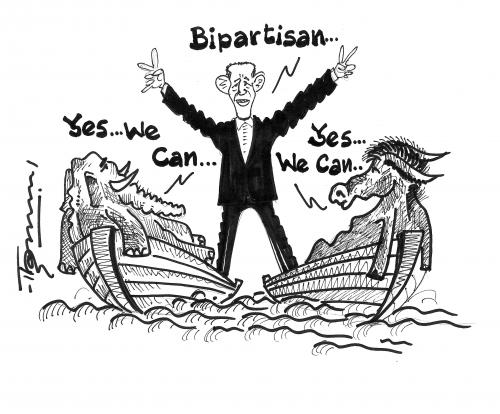 n of political polarization. Thus, their solution to the excess of partisanship is partisanship by another name: bipartisanship. The fetishization of bipartisanship in government rests in many cases on the denial of polarization among the populace. This view aims to keep the citizen innocent of partisan political engagement at all costs. One effect of this ideological presupposition can be seen in the de-politicization of the independent or moderate voter. The independent or moderate, it is assumed, is non-partisan, siding with neither of the duopoly parties over the other. It is no coincidence that this duopolist premise is favorable to the duopoly form. One could just as well argue, however, that the independent or moderate position is rather hyper-partisan in nature, resting on a rejection of both the Republican and Democratic Parties, but settling for one or the other when forced to do so. That such a proposition might be viewed as extreme, and hence unlikely to apply to independents and moderates, reveals less about the latter than it does about the partisan of the duopoly form, and the inconsistency of two-party ideology.
n of political polarization. Thus, their solution to the excess of partisanship is partisanship by another name: bipartisanship. The fetishization of bipartisanship in government rests in many cases on the denial of polarization among the populace. This view aims to keep the citizen innocent of partisan political engagement at all costs. One effect of this ideological presupposition can be seen in the de-politicization of the independent or moderate voter. The independent or moderate, it is assumed, is non-partisan, siding with neither of the duopoly parties over the other. It is no coincidence that this duopolist premise is favorable to the duopoly form. One could just as well argue, however, that the independent or moderate position is rather hyper-partisan in nature, resting on a rejection of both the Republican and Democratic Parties, but settling for one or the other when forced to do so. That such a proposition might be viewed as extreme, and hence unlikely to apply to independents and moderates, reveals less about the latter than it does about the partisan of the duopoly form, and the inconsistency of two-party ideology. The inconsistency of duopoly ideology is perhaps most apparent in partisan political Rorschach phenomena. Deanie Mills provides us with an example in a commentary on the 'misunderestimation' of Barack Obama by the political class:
on any given day, you can turn on Glenn Beck over at FOX news and see Obama raked over the coals for being weak on national security or being dictatorial on his domestic plans, and then switch over to Rachel Maddow and see him attacked for being "too much like Bush" in matters of national security or too weak in implementing his domestic program.Such incongruities are not confined to issues that polarize partisans across the duopoly divide, they are also apparent in intra-party disputes. An example is supplied by the ongoing struggle over the future of the Republican Party. Paradoxically, conservatives find the GOP too moderate, while moderates find it too conservative. This is likely one of the reasons why individual identification with the Republican Party is so low: people in both of these groups are exploring alternatives, which worries partisans on both sides of the duopoly divide. It is therefore no surprise that Democratic strategists are imploring the GOP to "get their act together" while their Republican counterparts seek to consolidate the base. Rush Limbaugh continues to plead for conservatives to stay with the Republican Party, rather than join explicitly conservative organizations such as the Constitution Party as many have begun to do. Limbaugh, yesterday:
I'm telling you, there's a lot of talk about third party out there; that we ought to go third party. No. Let me tell you who ought to go third party, the people that hijacked our party: Colin Powell, John McCain, some of these inside-the-Beltway types, let them go form their third party and let us have our Republican Party back. They're the ones hijacking this party from its days of victory. They're the ones that can take a hike and form your own third party, as far as I'm concerned.Ironically, this is already happening. Two examples spring to mind: Jana Kemp and Lincoln Chafee, both of whom are former Republicans running for governor as independents in Idaho and Rhode Island, respectively.







2 comments:
Limbaugh doesn't seem to understand that some of his own constituency want to leave the GOP because they're convinced that they can't get sufficient control over the party to steer it in a consistently "conservative" direction. He wants the people who apparently control the party to give it up without a fight when there's already been a fight (the 2008 primaries) and they won it. Limbaugh could do more than anyone, arguably, to make a "conservative" third party viable, but he's either too lazy or too cowardly to do so.
I don't know if it's laziness or cowardliness, or both, but it may just be fear, which has dangerously become the primary political motivator in the duopoly system.
Post a Comment